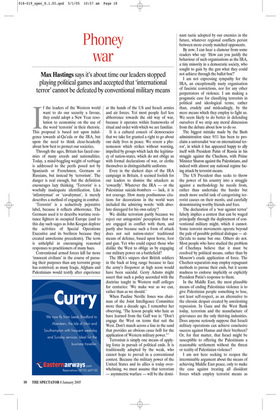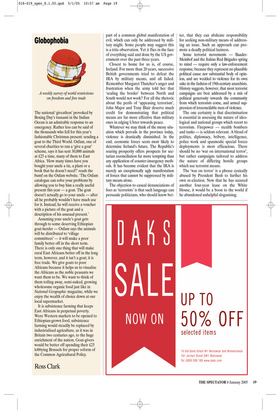Phoney war
Max Hastings says it’s about time our leaders stopped playing political games and accepted that ‘international terror’ cannot be defeated by conventional military means If the leaders of the Western world want to do our security a favour, they could adopt a New Year resolution to economise on the use of the word ‘terrorist’ in their rhetoric. This proposal is based not upon indulgence towards al-Qa’eda or the IRA, but upon the need to think clear-headedly about how best to protect our societies.
Through the ages, Britain has faced enemies of many creeds and nationalities. Today, a mind-boggling weight of verbiage is addressed to the perils posed not by Spaniards or Frenchmen, Germans or Russians, but instead by ‘terrorism’. The danger is real enough, but the definition encourages lazy thinking. ‘Terrorist’ is a woefully inadequate identification. Like ‘infantryman’ or ‘cavalryman’, it merely describes a method of engaging in combat.
‘Terrorist’ is a seductively pejorative label, because it reflects abhorrence. The Germans used it to describe wartime resistance fighters in occupied Europe (and to this day such sages as John Keegan deplore the activities of Special Operations Executive and its brethren because they created unwelcome precedents). The term is unhelpful in encouraging reasoned responses to practitioners of many hues.
Conventional armed forces kill far more ‘innocent civilians’ in the course of pursuing their purposes than any terrorist group has contrived, as many Iraqis, Afghans and Palestinians would testify after experience at the hands of the US and Israeli armies and air forces. Yet most people feel less abhorrence towards the old way of war, because it operates within frameworks of ritual and order with which we are familiar.
It is a cultural conceit of democracies that we take for granted a right to go about our daily lives in peace. We resent a phenomenon which strikes without warning, impelled by groups which lack the legitimacy of nation-states, which do not oblige us with formal declarations of war, or clothe themselves in distinguishable uniforms.
Even in the darkest days of the IRA campaign in Britain, it seemed foolish for our leaders to dismiss the attackers as ‘cowardly’. Whatever the IRA — or the Palestinian suicide-bombers — lack, it is not courage. How many posthumous citations for decorations in the world wars included the admiring words: ‘with absolute disregard for his own safety’?
We dislike terrorism partly because we reject our antagonists’ perception that we are engaged in conflict with them, and partly also because such a form of attack does not suit nation-states’ traditional means of defence, based upon horse, foot and gun. Yet who could expect those who dislike the West to oblige us by engaging our military power on a battlefield?
The IRA’s snipers shot British soldiers in the back at long range because to face the army’s firepower at high noon would have been suicidal. Gerry Adams might assert that such a policy accorded with the doctrine taught in Western staff colleges for centuries: ‘We make war as we can, rather than as we should.’ When Pauline Neville Jones was chairman of the Joint Intelligence Committee more than a decade ago, I remember her observing, ‘The lesson people who hate us have learned from the Gulf war is: “Don’t engage the West on terms that suit the West. Don’t march across a line in the sand that provides an obvious casus belli for the application of Western military power.”’ Terrorism is simply one means of applying force in pursuit of political ends. It is traditionally adopted by the weak, who cannot hope to prevail in a conventional contest. Because the military power of the United States and its allies is today overwhelming, we must assume that terrorism — asymmetric warfare — will be the domi nant tactic adopted by our enemies in the future, whatever regional conflicts persist between more evenly matched opponents.
By now, I can hear a clamour from some readers who say: ‘How can you justify the behaviour of such organisations as the IRA, a tiny minority in a democratic society, who sought to gain by the gun what they could not achieve through the ballot box?’ I am not expressing sympathy for the IRA, an exceptionally nasty organisation of fascistic convictions, nor for any other perpetrators of violence. I am making a pragmatic case for classifying terrorists in political and ideological terms, rather than, crudely and misleadingly, by the mere means which they employ to fight us. We seem likely to do better in defending ourselves if we strip any moral dimension from the debate about how to do so.
The biggest mistake made by the Bush administration since 9/11 has been to proclaim a universalist ‘war on international terror’, in which it has appeared happy to ally itself with President Putin of Russia in his struggle against the Chechens, with Prime Minister Sharon against the Palestinians, and indeed with almost any national regime facing attack by terrorist means.
The US President thus seeks to throw the power of his country into a struggle against a methodology he recoils from, rather than undertake the harder but much more useful task of categorising terrorist causes on their merits, and carefully denominating worthy friends and foes.
The declaration of a ‘war against terror’ falsely implies a contest that can be waged principally through the deployment of conventional military might, which it cannot. Some terrorist movements operate beyond the pale of possible political dialogue — alQa’eda to name but one. Others do not. Most people who have studied the problem of Chechnya believe that it must be resolved by political means, rather than by Moscow’s crude application of force. The Chechen separatists may employ repugnant methods to pursue their ends, but it seems madness to endorse implicitly or explicitly President Putin’s response to them.
In the Middle East, the most plausible means of ending Palestinian violence is to give Palestinian people something to lose, not least self-respect, as an alternative to the chronic despair created by unrelenting repression. In Gaza and the West Bank today, terrorism and the manufacture of grievances are the only thriving industries. Does anyone seriously suppose that Israeli military operations can achieve conclusive success against Hamas and their brethren? Or, for that matter, that Israel might be susceptible to offering the Palestinians a reasonable settlement without the threat or reality of Palestinian violence?
I am not here seeking to reopen the interminable argument about the means of achieving Middle East peace, only to make the case against treating all dissident forces which employ terrorist means as part of a common global manifestation of evil, which can only be addressed by military might. Some people may suggest this is a trite observation. Yet it flies in the face of everything said and done by the US government over the past three years.
Closest to home for us is, of course, Ireland. For more than 20 years, successive British governments tried to defeat the IRA by military means, and all failed. Remember Margaret Thatcher’s anger and frustration when the army told her that ‘sealing the border’ between North and South would not work? For all the rhetoric about the perils of ‘appeasing terrorism’, John Major and Tony Blair deserve much credit for demonstrating that political means are far more effective than military ones in edging Ulster towards peace.
Whatever we may think of the messy situation which prevails in the province today, violence is drastically diminished. In the end, economic forces seem most likely to determine Ireland’s future. The Republic’s soaring prosperity offers prospects for sectarian reconciliation far more tempting than any application of counter-insurgency methods. It has become evident that the IRA is merely an exceptionally ugly manifestation of forces that cannot be suppressed by military means alone.
The objection to casual denunciations of foes as ‘terrorists’ is that such language can persuade politicians, who should know bet ter, that they can abdicate responsibility for seeking non-military means of addressing an issue. Such an approach can promote a deadly political laziness.
Some terrorist movements — BaaderMeinhof and the Italian Red Brigades spring to mind — require only a law-enforcement response, because they represent no plausible political cause nor substantial body of opinion, and are wedded to violence for its own sake in the fashion of 19th-century anarchists. History suggests, however, that most terrorist campaigns are best addressed by a mix of political generosity towards the community from which terrorists come, and armed suppression of irreconcilable men of violence.
The one certainty is that discrimination is essential in assessing the nature of ideological and national groups which resort to terrorism. Firepower — stealth bombers and tanks — is seldom relevant. A blend of politics, diplomacy, bribery, intelligence, police work and spasmodic special forces deployments is most efficacious. There should be no ‘war on international terror’, but rather campaigns tailored to address the nature of differing hostile groups which use terrorist means.
The ‘war on terror’ is a phrase cynically abused by President Bush to further his own re-election. Now that he has secured another four-year lease on the White House, it would be a boon to the world if he abandoned unhelpful sloganising.











































 Previous page
Previous page